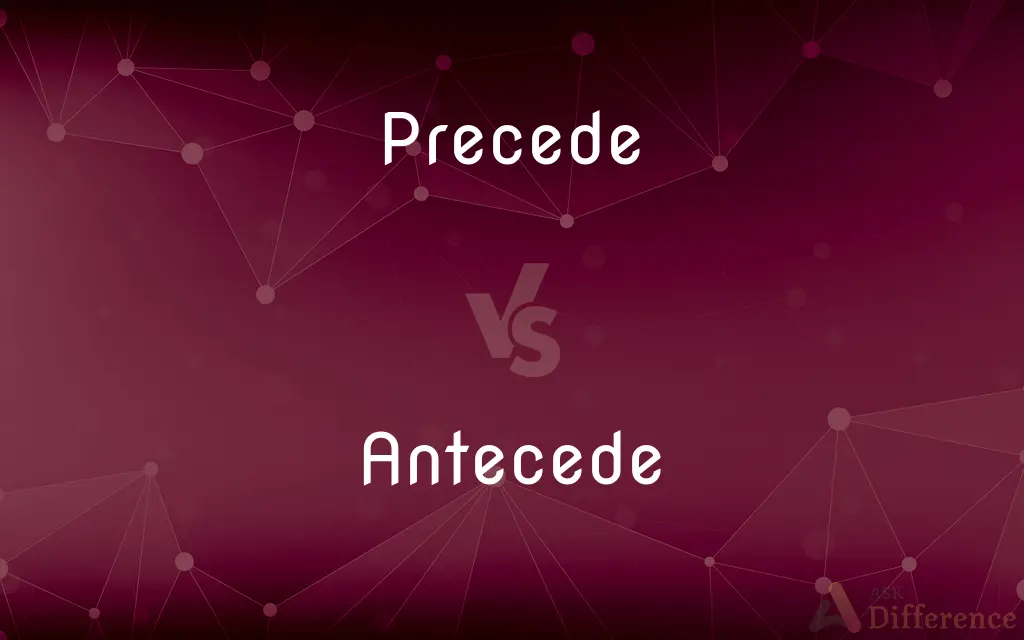Precede vs. Antecede — What's the Difference?
By Fiza Rafique & Maham Liaqat — Updated on April 2, 2024
Precede refers to coming before something in time, order, or position, while antecede is less commonly used but means to occur earlier or before in time.

Difference Between Precede and Antecede
Table of Contents
ADVERTISEMENT
Key Differences
Precede is commonly used to describe something that comes before another thing in sequence, time, order, or position. For example, the introduction precedes the main body of a book, highlighting its sequential order. Antecede, while similar in meaning, is less frequently used and specifically focuses on coming before something in time. It often appears in more formal or technical contexts. For instance, ancient civilizations antecede modern ones, emphasizing the historical timeline.
In terms of usage, precede is more versatile, applicable to a wide range of contexts including time, sequence, and spatial arrangements. It's used in everyday language as well as in specific fields like literature, law, and science. Whereas antecede is more narrowly defined and tends to be used in discussions that are historical or chronological in nature, often relating to the precedence of events or phenomena over time.
The connotations of precede also extend to the idea of preparation or introduction for what follows. For example, a preface precedes the content of a book, serving as an introduction. On the other hand, antecede carries a strict temporal connotation, lacking the implication of preparation or introduction that precede sometimes implies.
While both terms imply a relationship based on order, precede is more likely to be used in contexts where the sequence or arrangement has practical implications. For example, safety instructions precede a flight takeoff to ensure passenger safety. Antecede, however, would be more appropriate in a historical analysis, such as discussing how certain inventions antecede others, emphasizing their chronological order without implying a direct relationship or dependency.
Understanding the distinction between precede and antecede enriches the specificity with which we can discuss sequences, especially in historical and chronological narratives. Precede is broader and more commonly used, suitable for a variety of contexts, while antecede offers a more precise term for indicating temporal precedence without the broader connotations of sequence or preparation.
ADVERTISEMENT
Comparison Chart
Definition
To come before in time, order, position, or sequence.
To occur before in time.
Usage
Broad, applicable to various contexts including sequence and arrangement.
More narrow, primarily used in formal or historical contexts.
Connotations
Can imply preparation or introduction for what follows.
Strictly temporal, without implications of preparation or introduction.
Commonality
Widely used in everyday language and specific fields.
Less commonly used, often found in more formal or technical writing.
Examples in Use
Sequence in books, events, steps in a process.
Historical events, chronological order in narratives.
Compare with Definitions
Precede
Can indicate spatial or temporal precedence.
In a dictionary, 'ant' precedes 'bat'.
Antecede
Focuses solely on the aspect of time without implying preparation.
Dinosaurs antecede human existence on Earth.
Precede
Used in a wide range of contexts, including literature and everyday situations.
Opening remarks precede the main speech at conferences.
Antecede
Often used in more formal, historical, or technical contexts.
In legal documents, conditions antecede benefits.
Precede
Often implies a preparatory or introductory element.
Safety demonstrations precede the takeoff of an airplane.
Antecede
Specifically refers to occurring before something else in time.
Feudalism antecedes capitalism in European history.
Precede
Frequently used to describe sequences in descriptions and instructions.
In manuals, warnings precede the operating instructions.
Antecede
Commonly found in discussions of historical precedence.
The invention of the wheel antecedes that of the car.
Precede
Refers to something that comes before another in sequence or order.
The prelude precedes the first act of the opera.
Antecede
Used when emphasizing precise temporal relations in scholarly texts.
The Renaissance antecedes the Enlightenment.
Precede
To come, exist, or occur before in time
A lecture preceded the movie.
Antecede
To precede.
Precede
To be in front of or prior to in order
A precedes B in the alphabet.
Antecede
To go before; to precede.
Precede
To go in advance of
A marching band preceded the float.
Antecede
To predate or antedate.
Precede
To preface; introduce
Preceded her lecture with a funny anecdote.
Antecede
To go before in time or place; to precede; to surpass.
Precede
To be before in time, order, or position.
Antecede
Be earlier in time; go back further;
Stone tools precede bronze tools
Precede
(transitive) To go before, go in front of.
Cultural genocide precedes physical genocide.
Precede
(transitive) To cause to be preceded; to preface; to introduce.
Precede
(transitive) To have higher rank than (someone or something else).
Precede
Brief editorial preface (usually to an article or essay)
Precede
To go before in order of time; to occur first with relation to anything.
Precede
To go before in place, rank, or importance.
Precede
To cause to be preceded; to preface; to introduce; - used with by or with before the instrumental object.
It is usual to precede hostilities by a public declaration.
Precede
Be earlier in time; go back further;
Stone tools precede bronze tools
Precede
Come before;
Most English adjectives precede the noun they modify
Precede
Be the predecessor of;
Bill preceded John in the long line of Susan's husbands
Precede
Move ahead (of others) in time or space
Precede
Furnish with a preface or introduction;
She always precedes her lectures with a joke
He prefaced his lecture with a critical remark about the institution
Common Curiosities
What is the main difference between precede and antecede?
Precede refers to coming before in sequence, order, or position, while antecede specifically means to occur before in time.
How does precede relate to preparation or introduction?
Precede can imply a preparatory or introductory element for what follows, unlike antecede.
Can precede and antecede be used interchangeably?
While similar, they are not always interchangeable due to precede's broader application and antecede's specific temporal focus.
How do precede and antecede enhance communication?
They provide precise ways to discuss sequences and temporal relations, enhancing clarity in narrative and analysis.
Can antecede apply to spatial arrangements?
No, antecede is specifically related to temporal precedence and does not apply to spatial arrangements.
Is antecede a common term in everyday language?
No, antecede is less common and typically used in formal or technical contexts.
Is precede used in specific fields?
Yes, precede is used across various fields, including literature, science, and everyday contexts.
Is understanding the distinction between these terms important?
Yes, it aids in conveying specific meanings related to sequence and time, enhancing accuracy in communication.
Can precede refer to events in time as well as sequence?
Yes, precede is versatile and can refer to both temporal events and sequential order.
What type of writing is antecede most commonly found in?
Antecede is most commonly found in scholarly, historical, or technical writing.
How does precede function in instructional content?
It outlines the sequence of steps or information, often indicating what should be read, understood, or done first.
Can the use of precede or antecede affect the tone of a document?
Yes, using antecede can lend a formal or academic tone, while precede is more neutral and widely applicable.
Can precede imply causality?
Not directly; it indicates order or sequence, but causality requires additional context or explanation.
Why might someone choose antecede over precede?
To emphasize strict temporal precedence, especially in formal or historical analyses.
Does antecede imply a direct relationship between events?
It indicates temporal precedence but not necessarily a direct relationship or causality.
Share Your Discovery

Previous Comparison
Diagnose vs. Diagnosis
Next Comparison
Referee vs. ArbiterAuthor Spotlight
Written by
Fiza RafiqueFiza Rafique is a skilled content writer at AskDifference.com, where she meticulously refines and enhances written pieces. Drawing from her vast editorial expertise, Fiza ensures clarity, accuracy, and precision in every article. Passionate about language, she continually seeks to elevate the quality of content for readers worldwide.
Co-written by
Maham Liaqat















































